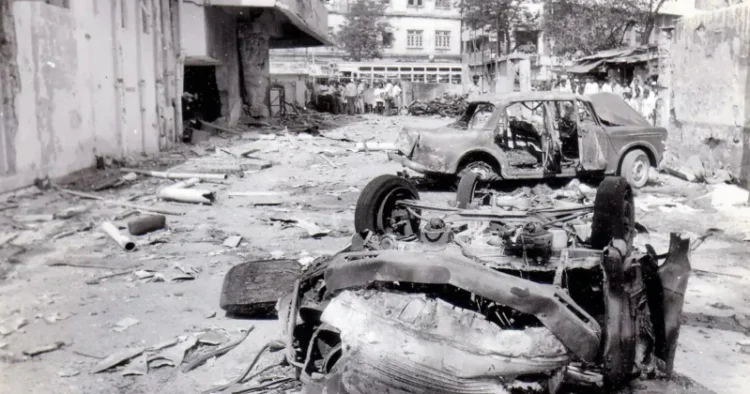March 12, 2024, marks the 31st anniversary of the 1993 serial bomb blasts in Mumbai (then known as Bombay). It brought the city’s most iconic buildings, including the Bombay Stock Exchange, to their knees. A series of nightmarish bomb blasts took place on the afternoon of March 12, 1993, between 1:30 pm and 3:40 pm. The deadly attacks resulted in the death of at least 257 people, while hundreds more were injured. The series of blasts on March 12, 1993, in Mumbai, was the city’s first tryst with terror.
The serial blasts were carried out by underworld gangster Dawood Ibrahim, with assistance from Tiger Memon. Reportedly, Memon also allowed his flats and garage in Mumbai for terrorist activities. The ‘Black Friday’ also turned Dawood Ibrahim, who was hitherto known in the city as an underworld don, into an international terrorist. The investigations into the explosion revealed the D-Company’s nexus with the Inter-Services Intelligence (ISI) of Pakistan and the global terrorist networks.
Believed to be one of the most significant terror attacks on Indian soil till the 26/11 Mumbai attacks, the 1993 bombings were also the first attack in which RDX was used as an explosive material. The full horror of what later came to be known as “Black Friday” was unfolded.
One thousand nine hundred ninety-three bomb blasts of Mumbai: What happened?
On December 6, 1992, the Babri Masjid was demolished in Ayodhya, which sparked widespread violence across the country. To avenge the demolition, Dawood Ibrahim and Tiger Memon hatched a conspiracy to commit a terrorist attack in Mumbai.
After holding a slew of meetings at multiple places across the country and abroad and delivery of arms and ammunition from Dubai and Pakistan, bombs were planted in Mumbai, leading to a series of explosions that shook the financial hub of India to its core.
Some of the major spots that became a target of the terror attacks were the Bombay Stock Exchange building, Masjid-Mandvi Corporation Bank Branch, Zaveri Bazaar, Fisherman’s Colony in Mahim Causeway, Plaza Cinema, Katha Bazaar, Century Bazaar, Hotel Sea Rock, and Air India building among other places. Most of the bombs were planted in cars and scooters.
The first blast was witnessed at the basement of the Bombay Stock Exchange building at around 1:30 pm on March 12. As a result, the 28-storey building and its surrounding structures were completely damaged leaving 50 people killed.
Over the next two hours till 3:40 pm, more blasts were reported from various locations in the city at regular intervals, triggering widespread chaos. The masterminds of the explosion – Dawood Ibrahim and Tiger Memon – could manage to stay far away from the reach of the law-enforcing agencies. So could several other accused. The Mumbai Police Crime Branch and the Special Task Force headed by the Central Bureau of Investigation arrested 193 accused.
While around 140 of them were put on trial, a few of them died during the course. Some 100 out of the suspected accused who faced trial were found guilty, whereas 23 were acquitted. The accused included the poor, most affluent, uneducated, and highly educated. Memon, himself, is a chartered accountant. Salim Tonk alias Salim Durrani, a member of the royal family of Tonk in Rajasthan, was a Rhodes Scholar. Bollywood actor Sanjay Dutt was also among the accused. The accused included customs officials and police officers as well.
Tiger’s brother Yakub Memon was arrested in 1994. He was found guilty of conspiring, organising, funding training, and buying cars for the blasts. He was convicted and awarded a death sentence in July 2007. Yakub was finally hanged in Nagpur Central Jail on July 30, 2015.
In June 2017, a special court found six prime suspects guilty of planning these attacks, including Abu Salem, Mustafa Dossa, Mohammed Dossa, Firoz Abdul Rashid Khan, Karimullah Sheikh, and Tahir Merchant in connection with the 1993 Mumbai blast case. The series of blasts on March 12, 1993, was the first coordinated terror strike on Mumbai, but it was not the last. The city continued to witness such attacks – in August 2003, July 2006, November 2008 and July 2011.
Bandaging the wounds might heal the physical scars, but the collective memories of ‘Black Friday’ are etched in the heart and mind. Nevertheless, Mumbai’s now-fabled spirit and resilience have always helped it bounce back.




















Comments